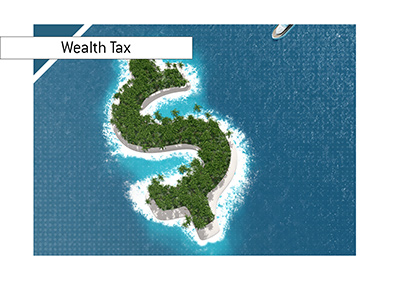Warren Kicks off Presidential Bid With New Wealth Tax Proposal
 According to the Washington Post, Senator Elizabeth Warren is set to propose a wealth tax that could potentially raise nearly $3 trillion over a 10-year period.
According to the Washington Post, Senator Elizabeth Warren is set to propose a wealth tax that could potentially raise nearly $3 trillion over a 10-year period. Warren, along with UC Berkeley economists Emmanuel Saez and Gabriel Zucman, are reportedly putting the finishing touches on the proposal that could be floated soon.
According to reports, Warren and her team believe that the wealth tax could potentially raise $2.75 trillion over the course of 10 years, and could hit roughly 75,000 families.
The tax would see rich families and individuals pay a 2% annual tax on fortunes of over $50 million, and a 3% annual tax on fortunes of more than $1 billion.
There would also be a one-time tax levied if families or individuals elected to move their assets to another country.
-
There are currently four OECD countries that currently have a wealth tax - France, Norway, Spain and Switzerland.
Warren's tax proposal could come in on the high end when compared to these four countries, with only Spain having a larger wealth tax.
Proponents of the tax believe that a wealth tax would work towards eliminating the growing gap between the rich and the poor, and the redistributed money could be put to much better use by the country.
Detractors of the tax argue that the majority of countries that have tried to implement a similar tax have ended up removing it, mainly due to lower than expected revenues and high administrative costs. The costs involved in policing the tax would be quite high, and many wealthy citizens of countries that have tried to implement a wealth tax have simply moved somewhere else.
-
As mentioned, four OECD countries currently have their own forms of wealth taxes currently in effect. Let's take a quick look at each of them:
Norway - Norway's wealth tax starts at approximately $164,000 USD in total net worth. A municipal rate of 0.7% of charged annually on net worth above that amount, while an additional 0.15% is charged for a national rate. The value of real estate assets is calculated at 50% of the current market value, 25% if it is a taxpayer's primary residence
France - France currently has a wealth tax on real estate alone. Prior to that, taxpayers were charged a rate of between 0.5% to 1.5% per year on net assets of over 800k EUR, assuming that your total net worth exceeded 1.3 million EUR.
Switzerland - Switzerland has a wealth tax that ranges from 0.13% to 0.94%, depending on where you live in the country. Switzerland's wealth tax kicks in if you have a net worth of approximately $100k USD or more.
Spain - Spain's wealth tax is one of the most aggressive in the world, with their tax rate ranging from 0.2% all the way up to 3.75%. This applies to net assets above a threshold of 700,000 EUR, with a 300,000 EUR primary residence allowance.
-
It seems very unlikely that such a wealth tax would pass into law in the United States in this day and age, especially given the fact that it would directly impact many members of Congress (both Republicans and Democrats).
Warren, who has been unafraid to challenge corporations and the rich during her time in Senate, has already thrown her hat into the ring for the 2020 Presidential election. In revealing details of her proposed wealth tax, Warren is hoping to capture the imagination of the left, who will likely be very pleased with the details of this new tax proposal.
Filed under: General Knowledge



